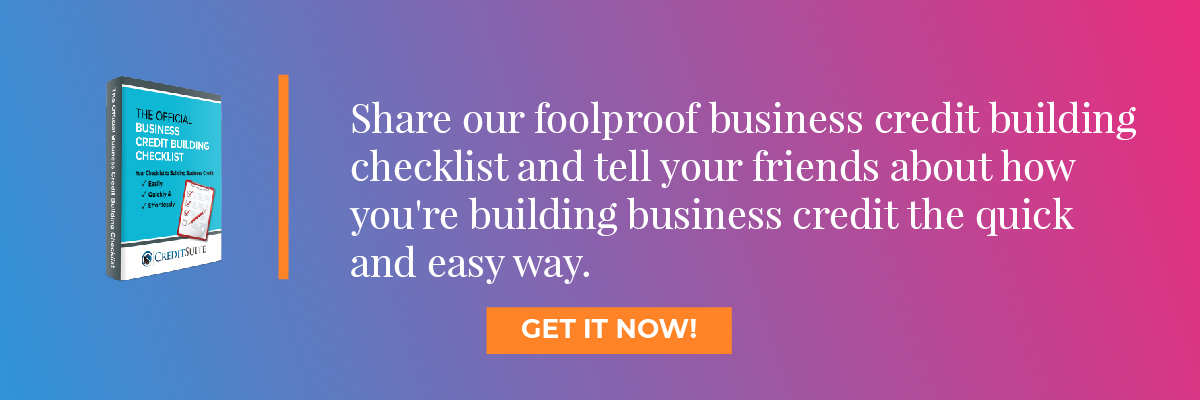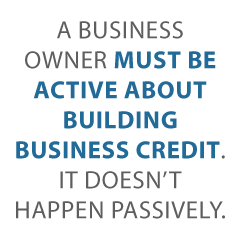- Connect With Us!
- (877) 600-2487
- info@creditsuite.com
Does Your Business Credit Card Show on Your Personal Credit Profile? It Might!
Published By Faith Stewart at October 16th, 2019
How to Get Your Business Credit Card Off Your Personal Credit Profile
If you have a business credit card, you probably think it isn’t affecting your personal credit profile. While ideally this would absolutely be the case, the fact it, it could be. There are ways to keep your business debt off your personal credit report, but it isn’t something that happens automatically. There is a very specific process that actually takes some time.
It also has to be intentional. A business owner must be active about building business credit. It doesn’t happen passively. The idea is to set up your business in a way that it easily exists in the eyes of credit reporting agencies (CRAs) and lenders as an entity separate from yourself. How do you do that? After you do, how do you get accounts that will report to the CRAs before you have a business credit score?
We can answer all these questions and more. We can walk you through the process and show you not only how to establish business credit that will not show up on your personal credit profile, but how to build it so that it is strong enough to qualify for any financing you may need.
One Business Credit Misunderstanding
One major misunderstanding when it comes to business credit is that if you have a business credit card, it isn’t on your personal credit profile. While this can be true, if you haven’t actively built business credit and you did not apply for the credit card with your business information, it likely is not true. The fact is, that card is a personal credit card that has a few extra perks due to its business designation. It is not actually a credit card that is based on the merits of your business credit profile. If a business credit card is in the owner’s name, it is on the owner’s personal credit profile.
Share our foolproof business credit building checklist and tell your friends about how you’re building business credit the quick and easy way.
How to Establish Your Business as Separate from Yourself
The question then becomes how do you separate your business from yourself. Many new small business owners operate as a sole proprietorship because it is just easier. They simply use their own contact information as their business contact information, and business finances mingle with personal finances.
When it comes to establishing business credit however, this just will not work. Here is what you need to do.
Get Incorporated
The first step is to incorporate. There are three options for this.
- C Corp– This is the most definitive separation, but it is also the most complicated and expensive. Before choosing this option, be certain there are reasons other than establishing business credit that it needs to be done. If it isn’t necessary for some other reason, there are other, simpler, less expensive options.
- S Corp– This option basically offers the same separation as the C Corp, but taxes are paid at the personal level, rather than requiring the business to be taxed as well, resulting in double taxation. It is also cheaper than incorporating as a C Corp. If you aren’t required to file as a C corp, this is a good alternative.
- LLC– forming a Limited Liability Corporation results in less liability, thus the name, and offers enough separation to serve the purpose of establishing business credit. If you are not required to be a C Corp or S Corp, this is the easiest and most cost-effective way to create the separation of business and personal credit needed.
The option you choose will depend on your specific tax and liability needs, as they each offer different levels of protection and expenses.
Get an EIN to Keep Accounts off Your Personal Credit Profile
You need to apply for an EIN. Stop using your Social Security Number as the identifying number for your business. Your SSN is a direct link to you personally. It is virtually guaranteed that anything connected to it credit wise will end up on your personal credit reports.
In fact, even if you follow all the other steps for establishing business credit but skip this one, accounts could end up on both reports. You don’t want that.
The process of applying for and EIN is easy. The IRS has an online form, and as soon as they verify all the information, you receive your number. It typically happens almost immediately.
Don’t Forget to Get a D-U-N-S Number
Dun and Bradstreet (D&B) is the most widely used business credit reporting agency. They issue each business on file a 9-digit D-U-N-S number. Application is easy and free, and once you have that number, you will be even closer to establishing credit for your business separate from your own.
Get Shiny New Contact Information
Your business needs its own phone number and address. This way, when you apply for credit, you can enter contact information that is separate from your own. When information is reported to agencies, sometimes the phone number and address are used as identifying factors. If you and your business share a number and address, that just decreases the level of separation.
Be sure you get your contact information listed in the directory under your business name.
Get a Dedicated Business Bank Account
If you don’t have one already, you need a dedicated business bank account in the business name. Make sure all business expenses run through this account. Not only does this help separate you from your business, but it will keep business expenses separate from personal expenses for tax purposes as well.
Business Website and Email Address
A lot of business owners do not realize how important this is. Truly, these days if you do not have a website, you do not exist. However, your business website needs to be professionally built and hosted on a paid service such as GoDaddy. The email address needs to have the same URL as the website. Free web hosting and free email services such as Gmail and Yahoo do not work well.
These things make your business look fundable to lenders. This is the first step to building business credit.
Establish Credit Lines with Vendors
If you are a new business and just starting with vendors, look for those that will extend credit and report to the top credit agencies. We call this the vendor credit tier.
Share our foolproof business credit building checklist and tell your friends about how you’re building business credit the quick and easy way.
If you have been around for a while and do not have credit with your existing vendors, ask for it. If they comply, ask if they currently report to the credit agencies, or if they will. Not all vendors do because it is not required. Not all are willing either. If your current vendors do not want to cooperate in this endeavor, consider switching to vendors that will.
Here are some of the starter vendors that are the easiest to get started with.
o Use Quill to order supplies you use every day, including pens, pencils, folders, printer ink, copy paper, and even cleaning supplies.
o Order shipping supplies, janitorial equipment, and more through Uline.
o Grainger offers industrial supplies as well as tools that you will need in the course of regular business.
It may be necessary to place a few initial orders with each of these before you can get net terms. There is no need to order anything you do not need however. They each sell things that business owners need in the everyday operations of a business. Once you make your on-time invoice payments and they begin reporting those payments to the credit agencies, your credit score will start to grow.
Talk to the Utility Companies
Sometimes utility companies are willing to report payments to credit agencies. However, you almost always have to ask. The worst they can do is refuse. If they do, no damage is done. If they agree, you will only establish your business credit faster.
Talk to them all, including telephone, electric, gas, and even internet. Before you do this, be certain that all of these utilities are in your business name with your business contact information.
Topsy Turvy: Your Personal Credit Profile Still Matters for Your Business
Taking these steps will help you establish separate credit for your business. That means your business credit cards and other business credit accounts will not show up on your personal credit profile. However, it is virtually impossible for the reverse of this to hold true all the time.
It’s true, your personal credit accounts will not show up on your business credit report. However, your personal credit can still affect your ability to get a loan even if you are using business credit. It doesn’t always, but it can. Here’s how.
First, some lenders insist on checking personal credit even if you have business credit. The thing is, if your personal credit isn’t up to par but you have strong business credit, you are more likely to get the loan anyway. That not so great personal credit score can affect your terms and rates however.
The other way that your personal credit profile can affect your business credit is this. Some CRAs actually use your personal credit in the calculation of your business credit score. While not all of them do this, there is really no way to know which of the CRAs your lender will choose to use.
The moral of this story is that you cannot ignore your personal credit profile while you are building business credit. You have to stay on top of your complete credit history.
Why Does it Matter if Business Credit Cards are on Your Personal Credit Profile?
You may be wondering why it matters. If your personal credit can affect things anyway, wouldn’t it be easier to just have everything in one place? The answer is a resounding no. In the long term, not having separate business credit is a bad idea.
The thing is, even if you make all your payments on time, your personal credit cannot handle the level of spending that running a business requires. Business credit cards that you get on your business credit have higher spending limits. These higher limits are designed to handle the larger spending amounts necessary to run a business.
Why does that matter? Well, when you carry balances at or near your credit limit, your debt-to-credit ratio goes up. A high debt-to-credit ratio has a negative impact on your personal credit score. With the level of monthly spending that most businesses require regularly, it is all but impossible to keep a low debt-to-credit ratio with business accounts on your personal credit profile, even with an immaculate credit history. This can impede your ability to get personal financing for things such as houses, home renovation, automobiles, and more.
Share our foolproof business credit building checklist and tell your friends about how you’re building business credit the quick and easy way.
Are Your Business Credit Cards Affecting Your Personal Credit Profile?
How can you know if your business cards are affecting your personal credit? Well, if you have not taken the steps necessary to separate your business credit from your personal credit, you can bet for sure this is happening. To know for certain, get a free copy of your personal credit report from each of the main personal credit CRAs. These include Experian, Equifax, and Transunion. You should be able to see them on there.
If you have strong business credit, call the credit card company and inquire about shutting down the card on your personal account and switching to a card on your business credit. If you do not yet have strong business credit, start building it now. When you have a high enough business credit score, take the steps necessary to remove the card that is on your personal credit and open new ones using your business credit.
You Don’t Know What You Don’t Know
If you aren’t sure if this is happening to you, or if you didn’t even know it was possible, find out now. Get copies of your personal credit profile and see what is on there. At the same time, start building business credit if you do not have it already. Then you can access all the funding you need to ensure your business is able to continue to grow and thrive.

 " class="attachment-blog-single size-blog-single wp-post-image" alt="Get Business Credit Cards for New Businesses Credit Suite-Business Line of Credit Decoded" title="Get Business Credit Cards for New Businesses">>
" class="attachment-blog-single size-blog-single wp-post-image" alt="Get Business Credit Cards for New Businesses Credit Suite-Business Line of Credit Decoded" title="Get Business Credit Cards for New Businesses">>
